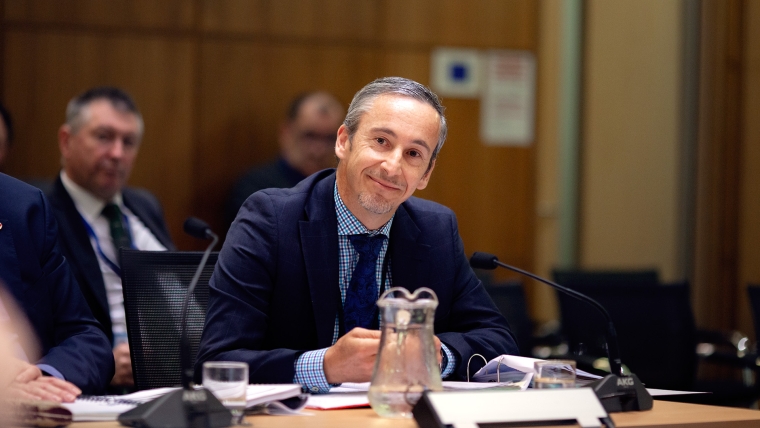
Chief economic adviser Dominick Stephens will leave Treasury as part of a major restructure under new Treasury Secretary Iain Rennie, aimed at refocusing the organisation.
Rennie, appointed by Finance Minister Nicola Willis and the Public Service Commissioner in November, confirmed a reshuffle in a newsletter published on Thursday afternoon.
Brace yourself for some public sector word soup and confusing titles…
He said deputy secretaries Struan Little and James Beard—previously responsible for the annual budget and macroeconomics, respectively—would move into newly created “Chief Strategist” roles.
The strategists will work across Treasury to use their “extensive networks and knowledge” to help achieve its three strategic outcomes: a strong and growing economy, sustainable government finances, and a high-performing public sector.
Three revamped deputy secretary roles have been created to align with the strategic outcomes: Economic Policy, Budget and Fiscal Performance, and System and Sector Performance.
The first two roles are new versions of Little and Beard’s former positions. The third is new, made up of commercial performance monitoring task previously led by Leilani Frew and public sector performance work which were spread across Treasury.
This role will be called Deputy Secretary System and Sector Performance and will primarily be about monitoring and improving the performance of state-owned entities and public sector agencies. This is a key focus for the National-led Government.
Chief Operating Officer Cath Atkins will remain in her existing role at Treasury, rebranded as Deputy Secretary Enabling Services and COO.
Dominick Stephens, who was Deputy Secretary and Chief Economic Adviser, has reportedly chosen not to apply for any of the new roles, despite being a credible candidate for the Economic Policy position.
Rennie said in the newsletter that Stephens and fellow deputy secretary Leilani Frew had decided it was “the right time for them to move on” from Treasury.
“I'm pleased however that both Leilani and Dom have agreed to remain to support the transition to our new more externally focused governance structure,” he said.
“Both have made substantial contributions during their time at the Treasury, but each has indicated that now is the right time for them to move on to new opportunities outside the Treasury in the next phase of their careers.”
Rennie praised Stephens for improving Treasury’s forecasting capabilities and for his influential work on housing markets. He commended Frew for her role in more active oversight of Crown entities — another key focus for the Government.
Four other plausible internal candidates for the new deputy secretary roles have also chosen to leave Treasury. They include the directors of Public Sector Management; Economic System, Growth and Public Services; and Financing, Infrastructure and Urban Development.
The moves coincide with a restructure at the Reserve Bank, which has had its budget cut both relative to the previous fiscal year and in real terms.
Editorialising
Willis has made it clear she was unimpressed with some of Treasury’s work under the Labour government, and has called for a more assertive approach with other parts of the public service.
She also wants more activist economic advice, and for Treasury to push ministers toward more ambitious reforms, as it did in the 1980s and 1990s.
Many of the directors and deputy secretaries leaving their roles were responsible for areas the National-led government has flagged as problematic: urban development, public service performance, Crown entities, infrastructure investment decisions, and economic growth.
Of course, some or all of them may simply want a change. But it has the look of a shake-up of a Treasury that hasn’t met Willis’ expectations.
An earlier version of this story incorrectly described changes to Cath Atkins' role and the new System and Sector Performance job.
4 Comments
Willis has made it clear she was unimpressed with some of Treasury’s work under the Labour government
However Treasury made some solid recommendations that were not adhered to by the 6th Labour government. This, on face, appears more to be Nicola plying her influence deeper into treasury. Dangerous territory, we shall wait and see if this amounts to cooking the books in Nationals favour by next election.
'a strong and growing economy, sustainable government finances, and a high-performing public sector.'
HAHAHAHAHAHAHAHAHAHA
The blind, being reported by the...
Did anyone ask anyone - politician or public servant - what underwrites 'a strong and growing economy'?
Same 24 hours the comment from (this) Morning Report re finite gas resources (applicable to all NNRs). In my opinion Dann represents ignorance steeped in narrative. He is not alone.
We have run, for the last 200 years, exponentially-increasingly, an extract-consume-eject regime. It had to cease, but prior to that it had to peak. Those are irrefutable facts. Treasury - indeed keystroked debt and all its attendant paraphernalia which includes Treasury - DO NOT MEASURE the stocks at the front end of that sequence, and therefore cannot see that GROWTH is temporary, and is peaking. Thus we're in 'the floggings will cease when morale improves' territory.
I look forward to Interest.co.nz peeling back the onion-skin a layer or two more than this article does.
Sounds like more Willis/Luxon cost cutting disguised by an elaborate vocabulary - their signature move.
They'll be getting pretty desperate by now. There is an inexorability about all this, that is patently obvious to anyone without skin in the politics. And he's fundy-brained (won't be an INTJ, for sure and certain). They're chasing a physical impossibility, when leaders around the globe, increasingly, are realising we're going to fight over 'what's left'.
https://www.thegreatsimplification.com/episode/reality-roundtable-16
(the guy from Rabobank is onto it)
And one for Dan: https://www.thegreatsimplification.com/episode/174-maren-urner (re journalism)

We welcome your comments below. If you are not already registered, please register to comment
Remember we welcome robust, respectful and insightful debate. We don't welcome abusive or defamatory comments and will de-register those repeatedly making such comments. Our current comment policy is here.